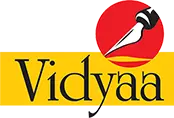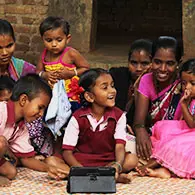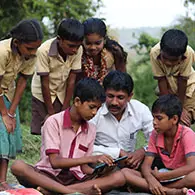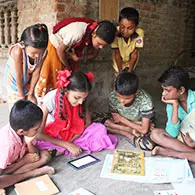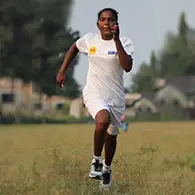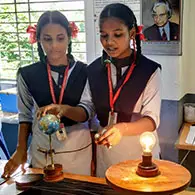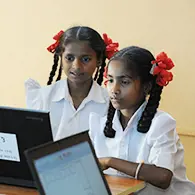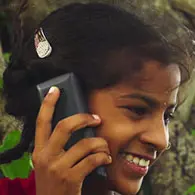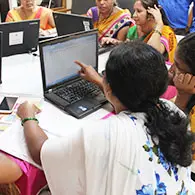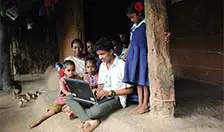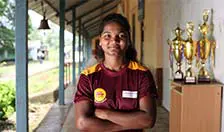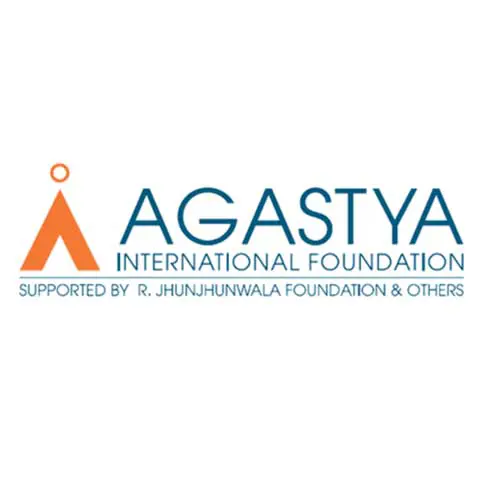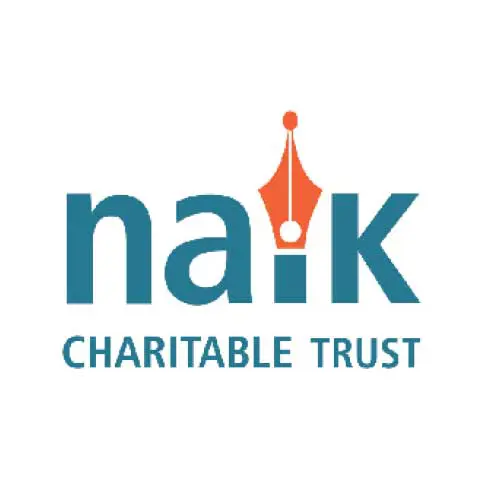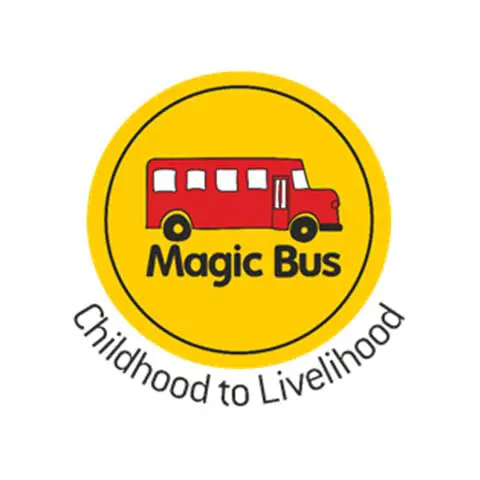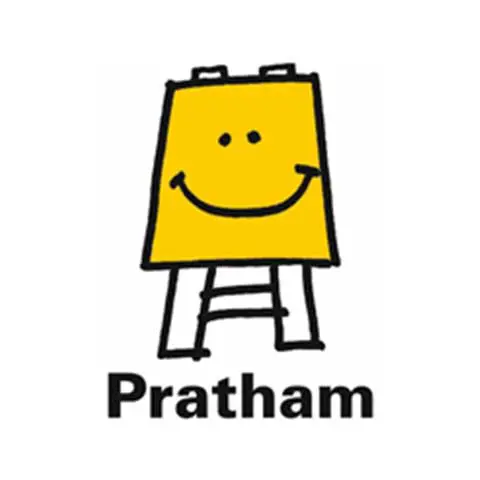EARLY CHILDHOOD EDUCATION
Early childhood—a time for remarkable growth and cognitive development—when the foundation for social skills, self-esteem, perception of the world, and a moral outlook is established in children. While supportive families, adequate nutrition, and healthcare play vital roles, the presence of favorable educational policies and social infrastructure largely affect a child’s overall development. Early childhood education also positively impacts the attendance, retention, and learning abilities of children in elementary and secondary schools. Investing in a child’s growth and development during early years, has proven to strengthen the foundation for lifelong learning.
Recognizing the long-term effects of education in the formative years, the Early childhood education programme ensures development of cognitive, socio-emotional and motor skills of 3-6 year old. The underlying philosophy of the programme lies in building a conducive environment within the household as well as the community at large. Skilled workers appointed by Pratham educate the children at model Anganwadi centers. Mothers are engaged to become educators as they play a crucial role in influencing learning levels of children outside the Anganwadi centers. Through context-specific teaching modules and interactive games, the learning experience for children is made more fun and engaging.

Intensive mother engagement
Mothers are encouraged to actively participate in their children’s learning experience and are equipped with simple techniques that can enhance learning even at home.
Capacity building of Anganwadi workers
Anganwadi teachers are trained using contextualized teaching-learning methodologies for delivering and sustaining quality education at the Anganwadi centers.
Introduction of number and letter recognition games
Skills in early numeracy and literacy are delivered through interactive group activities and games. From counting chapatis and rice grains to jumping into circles marked with different alphabets, diverse methodologies are used to help children recognize numbers and alphabets.
Context-specific teaching-learning material
Taking into consideration the presence of multiple dialects in Talasari, customised teaching-learning material such as local folklore and songs is curated to enhance the quality of learning among children.
Consistent community engagement
In order to engage members of the Panchayat Samiti, parents and community elders participate and take ownership of their children’s education, while periodic events such as Maths education fairs and events during festivals are organised at the community level.
Stakeholder engagement
To inspire systemic change, Project Vidyaa consistently engages with all key stakeholders in the early childhood education ecosystem—Anganwadi Supervisors, Child Development Project Officer (CDPO) and the Block Development Officer.
Data analytics
Using data analytics, high-quality evidence is generated to strengthen Block level planning, assess systemic gaps and complement existing Government surveys. The emphasis is on using data effectively to implement change, reward quality performance and motivate community workers.
REMEDIAL LEARNING
The transition from the primary education to the secondary education system is a crucial phase where learning levels shift from basic foundational skills to advanced competencies. While students in Classes 1-3 require regular engagement and interaction to ensure their abilities are well-developed, the upper primary segment requires building an environment that is conducive to group learning.
The Remedial Learning Programme organises 30-day Learning Camps for students in the primary segment (Classes 1-3) and upper primary segment (Classes 4-8), to help those who are lagging behind in studies,with remedial lessons in Language (Marathi) and Mathematics. These Learning Camps help students take ownership of their learning in a peer-supported environment.

Early learning for children in classes 1-3 The foundational skills of students are strengthened so that they understand educational content delivered to them in higher classes. Light activities are conducted to build phonological awareness and enhance oral skills in children, to improve their reading abilities. In Mathematics, the focus is on building number recognition skills in children and helping them solve basic arithmetic problems. Read India advanced intervention for children in classes 4-8 The activities conducted in this Learning Camp help students acquire deeper comprehension of the subject, encourage discussions, analysis of inferences and application of knowledge to different contexts. Learning goals also include better understanding of vocabulary and written expression of thoughts and opinions. Children are given home assignments and worksheets to keep them engaged in the learning process.
COMMUNITY LIBRARY INTERVENTION
Lack of access to public libraries in remote tribal areas makes it difficult for children to read outside school. Learning accompanied by reading habits reinforces the students’ interest in academics and improves their knowledge about the world they live in. Community libraries provide literature and an open space for children to think, question and evolve.

The Library Intervention Programme has been instrumental in promoting group learning and community involvement in the education of students. Created to inculcate a culture of reading and promote studying among children, the community library has further enhanced and sustained the learning capacities of students, thereby resulting in a positive change in their academic performance. The programme also enhances the impact of activities conducted in learning camps. Active involvement of siblings, parents, teachers and village leaders help cultivate better reading habits among the students.
Formation of library groups
Students from Classes 1-3 are actively engaged in studies after school hours. Facilitated by Cluster Assistants, library groups help students access new books, perform reading exercises and complete their homework. Children enjoy learning in groups and are comfortable answering each other’s queries related to their homework.
Community participation
Parents are encouraged to facilitate formation of library groups and help children resolve their doubts. Support from different community stakeholders has nurtured the development of study habits among students and their younger siblings
SPORTS FOR EXCELLENCE
Sports does not only build physical stamina but also instil character by helping develop qualities such as obedience, determination, willpower and discipline. From a health perspective, participation in sports reduces mental stress, enhances physical strength and stamina, improves sleep, and lowers risk of obesity. Sports education also promotes hygiene and sanitation. The abundance of sporting talent in tribal areas, and the interdependence of sports with development of social skills, necessitates the inclusion of sports in tribal schools to build competent and confident athletes and sportspersons.

The Sports for Excellence Programme, initiated in 2015 to cultivate a sports ecosystem among tribal youth, provides systematic training, expert guidance, and higher order coaching for children to improve their sports performance. Through the programme, tribal children are introduced to a healthy lifestyle and taught the importance of outdoor activities. Recognizing the existing talent among tribal children aged 12-18 years, Athletics, Kabaddi and Kho-Kho are the chosen sports to offer aspiring students with an opportunity to perform at the district, state and national levels.
Introduction of sports curriculum to serve as building blocks for future sportspersons
Coaching sessions are organized to develop students’ abilities in technical, tactical, physical and psychological aspects of sports. Students are encouraged to participate in external and internal sports tournaments organized by the Integrated Tribal Development Programme, Mumbai University, Sports Authority of India, local organizers and many more.
Building self-confidence and discipline, resulting in a decrease in absenteeism
The programme uses games to educate children about gender equality, health, and key social issues. The games are designed for development of personality and socio-emotional skills to instill a positive attitude and enhance positive behavior among students
Creating a pool of talented coaches, physical trainers and sports facility operators
Physical education teachers are trained to become effective coaches and help students excel in sports. Students are mentored and counselled on career opportunities as sports players and coaches, resulting in increased knowledge and access to potential employment opportunities.
PROMOTION OF SCIENCE
Science takes a central place in school education. From instilling a scientific approach to thinking, to inculcating attitudes of reasoning and problem solving, science as a subject has been beneficial in shaping young minds. However, public schools in remote rural areas often lack well-equipped science facilities and cannot offer field trip opportunities like urban schools. Also, science teachers have less access to professional learning workshops in these areas. The Science Education Programme was therefore launched to provide underprivileged children with practical exposure and hands-on education to stimulate interest in science as a subject.
Specifically designed for economically disadvantaged students and teachers from rural areas, the programme endeavors to inspire students to think, investigate, experiment and discover science in its entirety. Government schools have limited capacity in experiential science that helps spark curiosity and creativity among students. Keeping that in mind, the Science Education Programme strives to bridge this gap through a Hub and Spoke model of engagement.

Hub and Spoke model
Hub: Science Centres
100+ science experiments and models on Physics, Chemistry, Biology, Ecology and Astronomy are delivered to students and teachers from surrounding neighborhoods.
Spoke: Mobile Labs (science on wheels)
Students and teachers from remote areas are provided access to teaching material, models, videos and other instructional aids on a wide range of topics in Physics, Chemistry and Biology.
Teacher training programmes
Capacities of teachers and young instructor-leaders (student mentors), are strengthened in creative thinking, problem solving and practical application of scientific concepts.
Knowledge dissemination and learning
in the community
Summer/winter camps: Workshops for students to create models and experiments on scientific concepts
Night community visits: To generate awareness among parents and the community on science as a subject
Science fairs and competitions: To motivate students to become instructors and present their scientific knowledge and experiments to peers, teachers and visitors.
DIGITAL LITERACY
India is estimated to become an economic superpower in the near future, the youth who is impacted by globalization and digitalization, is expected to benefit the most from the country’s economic progress. In a country where more than half its population are living in rural and remote areas, digital literacy is almost non-existent. Similarly, for students residing in Talasari and Navsari, poor classroom infrastructure and shortage of trained computer teachers have resulted in a lack of access to digital education. While the Government has launched the Pradhan Mantri Gramin Digital Saksharta Abhiyaan for rural beneficiaries, the residents of Talasari and Navsari are yet to become a part of Digital India.
The Digital Literacy Programme solves the existing digital divide through the joint partnership of LTPCT, SAP India, Pratham Infotech in Talasari, Hope Foundation in Navsari and the education departments of local Governments. Setting up of computer labs and community-level digital literacy classes has enabled students, their teachers, and the community as a whole to gain knowledge and practice in computer technology. Quality training, digital inclusion and e-learning delivered to the last mile to students, teachers and the community, have given rise to a digital movement in these tribal areas.

Classroom infrastructure for effective digital learning
Well-furnished computer labs and courses on computer technology are integrated within the school timetable, to build a digitally friendly school infrastructure.
Skilled computer trainers—Sancharaks
Integral to the development of a digitally literate generation, local youth from the community are identified and trained to impart computer education. The cross-cutting nature of the programme has thus resulted in not just digital empowerment of local youth but generating employment opportunities for them as computer trainers.
Community digital literacy
Community Service Centers (CSCs), have provided villagers with access to Government information services. Community level digital literacy classes are organized to help villagers understand the advantages of using a computer to obtain information.
REMOTE TUTORING
Across India, 140 million students are enrolled in Government schools; however, 82% of students, particularly from marginalized communities, cannot read simple English words. In Talasari - an education backward block with a literacy rate of 44.8% - English language proficiency of teachers is inadequate. Consequently, students from upper primary and secondary schools generally lack the ability to read and write in English. Insufficient exposure to the language during their formative schooling years has limited the participation of tribal children in higher education. It hinders them from pursuing professional careers, thus impacting their aspirations for a better life. Recognizing the need for a novel solution to bridge the existing gap in English learning levels, the Remote tutoring programme was launched as a pilot for students of Classes 4-9, in Aarajpada, Talasari.

Over a mobile phone, each student is introduced to a proficient English speaker located remotely in cities, and tutored on pronunciation, punctuation, intonation, sentence comprehension and English vocabulary; thereby employing technological tools for English reading and speech improvement. In the pilot phase, 60 students were paired with 120 volunteers, to help students graduate to the next level of reading proficiency and reduce their fear of English as a language. The volunteer and student have the same story text on their respective mobiles, where the student reads out a passage and the tutor corrects the student’s pronunciation, punctuation and comprehension.
Engaging volunteers in the learning process
Considering the limited availability of trained English teachers in Talasari, this programme mobilises volunteers—homemakers and youth, as remote tutors. Volunteers are connected with students through mobile phones, and English reading lessons are delivered remotely.
Deployment of technology
To simplify the logistics of content distribution and facilitate distance learning, two technological platforms were a web platform hosted on the domain www.readastory.org.in and the cloud telephony platform.Once the volunteers are sensitized and inducted into the programme, they are assigned log-in credentials through the web platform. The system maps each volunteer with a student. Lessons are conducted through the platform, where reading content is digitally uploaded for the volunteer to access.Volunteers schedule calls with the students through the cloud telephony platform—an online communication technology that is hosted on the cloud through the Internet. Support from the cloud allows placement of calls from any location without the need for additional equipment.
Reading levels assessment and evaluation
The advancement in language skills is measured using an assessment tool derived from the ASER 2017 English evaluation protocol, that evaluates the progress in reading levels of each student.
CAPACITIES BUILDING OF TEACHERS
Teachers are the backbone of every education system. Investing resources towards teacher training programmes to enhance their skills is essential for delivering quality education. Capacity building of teachers for improved knowledge dissemination and sustained strengthening of the educational eco-system are the ultimate goals of LTPCT’s teacher training initiatives.
Science teachers’ training programme
The programme helps teachers understand science concepts, builds their skills in creative thinking and problem solving. The programme also provides solutions for creation of an engaging classroom learning experience for students.
Mathematics teachers’ training programme
Training in modern teaching techniques and presentation of model answers is imparted by Master Trainers, who have experience of working with ‘Bal Bharati’, are Chief Moderators and are recipients of state level awards for ‘Best Teacher’. Tribal students find it difficult to clear the Board exams because of their difficulty in understanding Mathematics. It’s important to build the capacity of teachers in using innovative methodologies in sync with the syllabus.

English teachers’ training programme
This is a training-cum-workshop organised for school teachers from Kharel, Navsari, to refresh their basic teaching skills in the English language and provide the latest techniques to improve the students’ English language proficiency.
Training workshops for school teachers
While school teachers are given training on the Digital Literacy Programme at workshops in Talasari and Navsari, they also undertake training on the Sports for Excellence Programme in Talasari.
